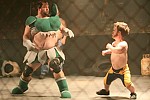 Shadows off the beaten path
Shadows off the beaten pathMIDGETS VS MASCOTS | TINY FURNITURE
< < I N D I E S > >
last update 8.Jan.11
See also: SHADOWS FILM FESTIVAL
 R E V I E W B Y R I C H C L I N E
R E V I E W B Y R I C H C L I N E
scr Steve Lewis, Tony Owen
prd John Maxwell, Bruce Webb
with Eugene Byrne, Josh Bolt, Liza Tarbuck, Neve McIntosh, Connor McIntyre, Catherine Rice, Bryony Seth, Leanne Best, Kate Henry, Paul J Dove, Beverley Eve

release US Oct.09 ciff,
UK 3.Dec.10
09/UK 1h35
 Unusually honest for a teen film, this low-budget Liverpool drama explores extremely strong themes with raw humour and emotion, never dipping into melodrama. It also features sharp performances from its young central duo.
Unusually honest for a teen film, this low-budget Liverpool drama explores extremely strong themes with raw humour and emotion, never dipping into melodrama. It also features sharp performances from its young central duo.
At age 15, Ziggy (Byrne) and his best friend Robbie (Bolt) are typical teen boys, obsessed with the idea of sex. But Robbie is much more aggressive about going for it. So when he ends up in hospital with a serious heart condition, Ziggy decides to help him with his only wish: not to die a virgin. Robbie's parents (McIntyre and Rice) are fairly oblivious to all of this, while Ziggy's mum (McIntosh) is feeling like she's being left behind. But then, she's been keeping an important secret from Ziggy most of his life.
What's most refreshing about this film is the way these 15-year-olds behave like authentic teens, rather than the usual movie versions. They're always up to something, oblivious to rules, swearing like sailors - clearly an attempt to appear grown-up rather than any actual maturity. On the other hand, the screenwriters' indulge in some corny touches as well, such as how Ziggy's attempts to procure a woman for Robbie often end up as slapstick set pieces.
This fragmented approach makes the film drag a little, but the hesitant, character-based drama keeps us engaged. And there are some tense moments along the way. Byrne and Bolt are excellent, adding levels of subtext that develop both the comedy and seriousness. Byrne is especially good as a shy guy who is forced out of his shell to talk to girls. And the stress all of this puts on their friendship is realistic and believable.
In the end, the film feels rather slight and sweet, but the filmmakers manage to avoid sentimentality, which is no mean feat with this premise. The wry observational comedy, intense emotion and unhurried plot actually work together to draw us in. And while the ethical questions about underage sex seem like the film's main theme, the most lingering challenge is found in the way the script explores the damage parents can do when they justify lying to their children in order to protect them.
14.Sep.10
 R E V I E W B Y R I C H C L I N E
R E V I E W B Y R I C H C L I N E
scr Sean Conway
prd Ashley Horner, Karl Liegis
with Nancy Trotter Landry, Liam Browne, Michael Hodgson, Arabella Arnott, Stephen Bent
 release US Apr.10 tff,
release US Apr.10 tff, UK Jun.10 eiff
10/UK 1h37

 This low-budget British drama really captures the giddy highs of new love, with a liberated physicality that's rare on screen. And the cast is very good too, even if the story they're in never seems to go anywhere.
This low-budget British drama really captures the giddy highs of new love, with a liberated physicality that's rare on screen. And the cast is very good too, even if the story they're in never seems to go anywhere.
In a small English town, Manchester and Noon (Browne and Landry) are madly in love, happy to live in a garage where they do little but have sex and take photos of each other. Life is simple; they steal food to eat and cars for joyrides to the beach. And their conversations start to get more serious just as local artist Franny (Hodgson) sees Manchester's photos and offers him cash for a gallery show. But Noon is furious about making their private life a commercial show, and their happy romance starts to unravel.
The film has feels relaxed and improvised, letting us feel this couple's self-imposed isolation in the sunny countryside. They indulge madly in their passion for each other, so of course some sort of outside force is destined to test their bond. This plot swing isn't hugely convincing, but it's played by the actors with a disarmingly raw honesty, so we kind of go with it. And director Horner keeps things loose and scruffy even when the action shifts to Franny's huge house, where his wife (Arnott) enters the scene to create an increasingly tense four-way dynamic.
As the film's mood changes from bright and easy to edgy and dark, Horner struggles to deepen the drama. Although we vividly feel Manchester and Noon's attraction and infatuation, there isn't much sense of actual love between them. And this becomes clearer as Manchester weighs the value of artistic fame and romantic integrity. His inability to cope with this decision is played without much explanation, reflecting his lack of self-awareness. This kind of undermines the film's pacing, even as it makes it both intriguing and oddly endearing.
But it also makes the scenes of heart-wrenching relational trouble feel overwrought. And as the art gallery plot starts to drift into satire, Horner's obsession with sex and nudity begins to feel somewhat voyeuristic, especially since the story is mainly seen through Manchester's leery perspective. So in the end the film feels almost as vacuous as the relationship.
21.Jun.10 eiff
 R E V I E W B Y R I C H C L I N E
R E V I E W B Y R I C H C L I N E
scr Terry Mann, Kevin Andounian
prd Brad Keller, Joey Stewart
with Gary Coleman, Mark Hapka, Brittney Powell, Akie Kotabe, Richard Howland, Jason Mewes, Josh Sussman, Jordan Prentice, Terra Jole, Nic Novicki, Ron Jeremy, Scottie Pippen
 release US May.09 tff,
release US May.09 tff, UK 10.Jan.11
09/US 1h22
 Combining reality, improvisation and scripted scenes, this hybrid comedy aims for Borat/Bruno but only achieves Jackass/Dirty Sanchez status. It definitely has its moments, but simply isn't creative enough to be a classic.
Combining reality, improvisation and scripted scenes, this hybrid comedy aims for Borat/Bruno but only achieves Jackass/Dirty Sanchez status. It definitely has its moments, but simply isn't creative enough to be a classic.
After the death of Big Red (Howland), a legendary Texas sports mascot who later became a diminuitive pornstar, his son (Hapka) and widow (Powell) are told that, to get their money, they must stage a 30-day competition between midgets and mascots. So the two teams are assembled, and competing with on midget team is former child star Coleman, who one teammate calls the "Shaquille O'Neal of little people". With 30 events overseen by Big Red's assistant (Kotabe), the competition spirals increasingly out of control.
An opening caption informs us that during the filming a number of people were injured and arrested. But despite the documentary style, this is clearly pure fiction. Essentially, it's just a relentless string of gross-out comedy, including non-stop sex and fart jokes, plus running gags about mascot fetishes, paedophilia and pornography. It's set up to look as politically incorrect as possible, but it's not actually that trangressive.
This is mainly because the performers are all in on the joke. But this gives the movie a genuinely free-wheeling comical tone, mainly because it shows that all of these people are unafraid to laugh at themselves. Hapka and Powell have a certain skill at improv, even with their cartoonish performances. And even the actors who are playing themselves (like Coleman and Pippin) go for broad silliness, creating goofy versions of themselves that aren't remotely believable.
In other words, this is a relentlessly juvenile film that wallows in its trashy vibe. Along the way, some bits are genuinely funny, But the competition events are ludicrous; things like cage fighting, riding a bucking-bull machine, three-legged races and a variety of drinking games are pretty boring. More inventive are rodeo poker, because it's so seriously idiotic, and gator-wrestling, because it's so stupidly staged. The best sequence is the karaoke competition, which gives Glee a deranged run for its money. The worst is the climactic showdown and epilogue, which lamely stir in both sentimentality and moralising.
8.Jan.11
 R E V I E W B Y R I C H C L I N E
R E V I E W B Y R I C H C L I N E
prd Kyle Martin, Alicia Van Couvering
with Lena Dunham, Laurie Simmons, Grace Dunham, Jemima Kirke, Merritt Wever, David Call, Alex Karpovsky, Sarah Sophie Flicker, Garland Hunter, Amy Seimetz, Isen Ritchie, Mike S Ryan
 release US 12.Nov.10
release US 12.Nov.1010/US 1h38
SXSW FILM FEST
 Dryly witty, with a homemade-film aesthetic, this slacker comedy is packed with dialog that's snappy and rather overwritten. It's a pretty annoying movie, but it definitely touches a nerve.
Dryly witty, with a homemade-film aesthetic, this slacker comedy is packed with dialog that's snappy and rather overwritten. It's a pretty annoying movie, but it definitely touches a nerve.
After graduating from film school, Aura (Lena Dunham) returns home to her artist mother's (Simmons) spacious Manhattan studio and immediately falls back into routine, slobbing around and bickering with her sister (Grace Dunham). She runs into a larger-than-life childhood friend (Kirke), who helps her get a job as a day hostess in a bar. And she tries to connect with a couple of guys (Karpovsky and Call), but her life resolutely refuses to kick-start itself. Sooner or later she'll realise she needs to take things into her own hands.
It's hard to escape the feeling that this film is just a lot of navel gazing, as Aura drifts into adulthood without much passion for anything. Of course, she's easy to identify with, and it's great to see a female-centred approach to this theme. The film is essentially a series of random conversations and encounters that are extremely realistic, perhaps because Aura's sister and mother are played by Dunham's actual sister and mother. In other words, this feels like a documentary about a period of life that's only interesting to the person who's living it.
Explicitly aiming for a Woody Allen vibe, Dunham's writing and direction are funny and observant, but they're also self-indulgent. Not only does everyone continually compliment Aura, but she's resolutely childish and manipulative ("Mommy, I'm really young and having a really hard time!"). Even so, the off-handed performances somehow win us over, holding our interest as we follow Aura on her low-energy journey. And there are a couple of strongly introspective moments along the way.
Mainly, it's the film's sardonic sense of humour that connects with us, as it highlights the absurdity in each person's life. And Dunham is also poking fun of people who aspire to be artists, even as her film is essentially a performance-art piece. So underneath its annoying surface, this is an intriguingly smart, astute comedy with strong characters and a striking visual sensibility. If Dunham can widen her gaze beyond herself, she may prove to be a filmmaker to reckon with.
23.Dec.10


See also: SHADOWS FILM FESTIVAL
© 2011 by Rich Cline, Shadows
on the Wall